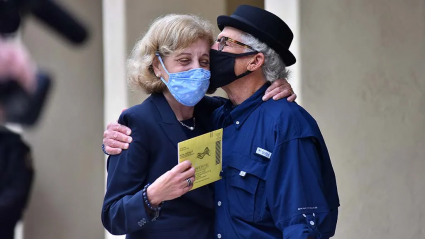 By Ken Stone, Times of San Diego, a member of the San Diego Online News Association
By Ken Stone, Times of San Diego, a member of the San Diego Online News Association
Photo: La Jolla couple Barbara Bry and Neil Senturia with their new book on Gina Champion-Cain. Times of San Diego photo illustration
September 2, 2022 (La Jolla) - Gina Champion-Cain hasn’t read her own book.
The former toast-of-the-town businesswoman, whose San Diego career became toast, is the speaker in “I Did It: The Largest Woman-Run Ponzi Scheme in American History.”
In reality, La Jolla couple Barbara Bry and Neil Senturia did it — write the 285-page work (Waterside Productions, $27.95, with pre-orders on Amazon).
Based on 40 hours of interviews over four months before her March 2021 sentencing, and later email exchanges from her East Bay prison camp, the “as told to” book is almost completely in Champion-Cain’s voice.
Senturia said he would send Champion-Cain a signed copy “if the prison will let a hardback in. … I suspect it will make good reading for the other 90 inmates.”
“I Did It” won’t be released until Sept. 13, but Bry shared a review copy in PDF. Right after finishing it, I emailed the authors: “Mega mazel tov on this masterpiece!”
No apologies. The book is a master class in airing one’s own dirty laundry.
 Photo, right: Ingrid Croce (left) and Gina Champion-Cain were featured in 2013 issue of San Diego Woman.
Photo, right: Ingrid Croce (left) and Gina Champion-Cain were featured in 2013 issue of San Diego Woman.Champion-Cain tells how beginning at 11 p.m. one rainy Saturday in January 2013 — her husband asleep in their Mission Hills home — she “pounded the keyboard” looking for numbers of expired or inactive Northern California liquor licenses.
“I had to find licenses far away enough that the investors weren’t going to get in their cars and check out Joe’s Bar and Grill in Petaluma,” she says. “That could prove embarrassing.”
Desperate to raise $600,000 to finish work on her money-losing Pacific Beach restaurant, The Patio on Lamont, Champion-Cain began her infamous slide.
Her enablers included her investors and “bundlers.”
“The combined greed and stupidity of the participants across all levels was almost beyond belief,” she says. “I was waiting to stop the madness if anyone had taken the time to call me on it.”
She’d later say: “I’d spent the entire seven years of the scam crafting a very detailed and achievable exit strategy whereby I could reimburse everyone. … I employed almost 800 people, and everyone got health insurance. I was deeply active in the community and in several charities.”
A repeatedly apologetic Champion-Cain cites many motivations, including wanting to prove herself to “white males” and feeling the “high of being able to do so many good things for others.”
She says: “I knew that I was giving away money that wasn’t mine, but maybe in an arrogant way, I thought I could use it better than the investors.”
Named in at least 11 lawsuits, Champion-Cain, 57, says she’s amazed “the program” lasted for so long before pleading guilty in August 2019 a day after meeting with the SEC.
“Inspector Clouseau could have figured it out,” she says of the $400 million scam. “I wanted the merry-go-round to stop, but no one seemed to know where the off switch was.”
‘Steve Feels Betrayed’
The book was finished before her husband, Steve Cain, filed for divorce in April.
“I know that Steve feels betrayed,” she says, “but I’m not getting a life sentence, so I’ll have to leave the final decision to Steve on that one. I think we’ll stay married, but who knows?”
Champion-Cain charts her rise and how — years before the Ponzi scheme — she “wanted to pick the brains of the best in the business — without them knowing they’d been picked.”
She tells the authors: “All I needed was an elegant, simple, devious plan. The company was filled with nice white men, and let’s face it, they were suckers for long legs and cookies, and I had both.”
She used chocolate-chip cookies — and cakes and bowls of M&Ms — to lure men she targeted as mentors and means of corporate ladder-climbing.
“But it was still a male-chauvinist world, and as I maneuvered through it, I had to continually duck and dodge the offers of ‘Why don’t you come up and see my etchings; I have an extra toothbrush.’”
No doubt Champion-Cain was a workaholic with real-estate genius. Her magic included reviving a Koll Co. “problem child” — the La Jolla Village Square retail center — and finding a way to buy the empty downtown Woolworth Building. She opened a House of Blues in the Gaslamp.
She has a way with words, too.
- “I was always going to get a second look . . . even if I didn’t get a second chance.”
- “He saw liquor-license lending as hard money on steroids. He was like a dog in heat.”
- “We were Thelma and Louise redux. It was joyriding with the top down on a straight road going 50 miles per hour over the limit.”
- “You might say it was the blind leading the nearsighted. And no one put on their reading glasses.”
- “It was a raging river, I was in a raft, and frankly, I wasn’t sure where the waterfall was.”
I asked the authors: Did Gina really say these things?
Said Senturia, who’s known Champion-Cain for 20 years: “Well, if she didn’t say them word for word, she certainly said them. … Gina is a very smart woman — she majored in philosophy at the University of Michigan.”
Shared in Writing, Revising
In email exchanges, the authors filled in the backstory of “I Did It.”
Senturia — a San Diego Union-Tribune business columnist with two previous books under his belt — says he wrote the first draft. Former business journalist Bry rewrote and added information “and then both of us participated in further revisions.”
Ex-Councilwoman and San Diego mayor candidate Bry says she read all the transcripts of Champion-Cain’s court cases along with many filings.
 Photo, left: Gina Champion-Cain being interviewed on ESPN in 2015. Image via YouTube.com
Photo, left: Gina Champion-Cain being interviewed on ESPN in 2015. Image via YouTube.com"After Gina was in prison (where she has email access), I asked Gina questions via email, and during Neil’s interviews with Gina, I supplied questions to ask,” Bry says.
Senturia never spoke to the fallen star in prison, saying it was very hard to get permission and the camp was sometimes in COVID-19 lockdown.
They sought bigger publishers — “big shots on the East Coast” — but were told to “die and pound sand.” The story was dismissed as “only local and of no interest beyond San Diego,” he says. They ended up with Encinitas-based Waterside.
No bites yet from Hollywood, but one-time screenwriter Senturia says the CNBC series “American Greed” is featuring Champion-Cain in October. (“They interviewed me on camera,” he says.)
Prisoner Won’t Profit
On Twitter, one San Diegan raised the perennial question about true-crime books: “Will the proceeds go to helping repay her victims? Otherwise, no one better buy this.”
Senturia, asked for his reply, said: “Victim restitution is complicated. Gina does not have any share of the book proceeds."
Although the book quotes the aggrieved at her sentencing hearing, former Champion-Cain employees or associates like Pamela Corey and Hilary Rossi (who have cited a “company in chaos”) aren’t quoted.
 Photo, right: Neil Senturia and mayoral candidate Barbara Bry get ready to vote at a La Jolla library on Election Day 2020. Photo by Chris Stone
Photo, right: Neil Senturia and mayoral candidate Barbara Bry get ready to vote at a La Jolla library on Election Day 2020. Photo by Chris StoneHow would he respond to those who’d call the book a reputation-rehab effort?
“Critics can say what they want,” Senturia said. “Gina owns the crime; she never varied from that.”
In prison, he says, “Gina is active in teaching, and has completed paralegal certificate. She is clearly a force for good in the prison. She also teaches cooking; she is very busy. She is also active in protesting sexual abuse by the guards. You can Google stories about the allegations. Congresswoman Jackie Speier has visited the prison once and is supposed to return.”
Senturia is sure Champion-Cain will return to San Diego when she’s sprung — possibly in 2034.
“She has clear plans to make other people’s live better and she certainly has a future as a motivational speaker,” he said. “She is quite charismatic, as you know.”
Bry also considers the former restaurateur truly remorseful for making bad choices and causing pain to so many people, she says in the book, adding: “I know that she wants to use the next chapter of her life, particularly her time in prison, to help others.”
The book closes with biographical chapters on Bry, 73, and Senturia, 76 (married in 2000). His is revelatory.
Senturia’s Own Scam
In 1972, after graduating from the American Film Institute, Los Angeles resident Senturia was seeking a way to pay bills while “laboring in the field known as screenwriting, which bears a close resemblance to being unemployed.”
Under the fake name Paul Biegler — the attorney played by Jimmy Stewart in “Anatomy of a Murder” — he joined a phone bank hawking toner cartridges made by a “fly-by-night organization in Texas.”
His outfit bought $2 cartridges for $11 and sold them for $80 each to banks, often in six-packs for $480. His boiler room was “no different from the one run by the Wolf of Wall Street — just a different product.”
“Did I know that we were involved in a ‘shady’ and potentially illegal scheme? Yes. Did I continue to sell toner each morning? Yes.”
With a fellow scammer, he started his own toner seller, renting a warehouse and installing 15 plywood cubicles covered in carpet to muffle the sound of 25 phone lines.
“After about two years, we’d grown to be the second-largest telephone sales shop on the West Coast, and then one day I get a letter on the official letterhead of a ‘federal agency.’ … It had certain words in it referring to the USPS and mail fraud and felony … and the rest of the letter was a blur.”
The jig was up.
“In a scene right out of ‘The Sting,’ we dismantled the entire warehouse, ripped out all the cubicles and phones, and the entire operation disappeared in five days,” he writes.
He says he stood on the abyss and peeked over the edge.
“My partner and I were terrified, and for sure, I had no moral confusion: I was aware that we were running a scam. I’d dodged a bullet, and I knew it.”
And that, he says, is why he chose to write about Gina Champion-Cain.
I asked Senturia why he shared his brush with the feds.
“It shows how easy it is to slip into the dark side,” he said. “I was lucky, dodged a bullet, but everyone thinks they would never do the wrong thing, and that frankly is dead wrong. Like lots of felons, their last thought before pulling the trigger is always ‘I won’t get caught.’”







Recent comments